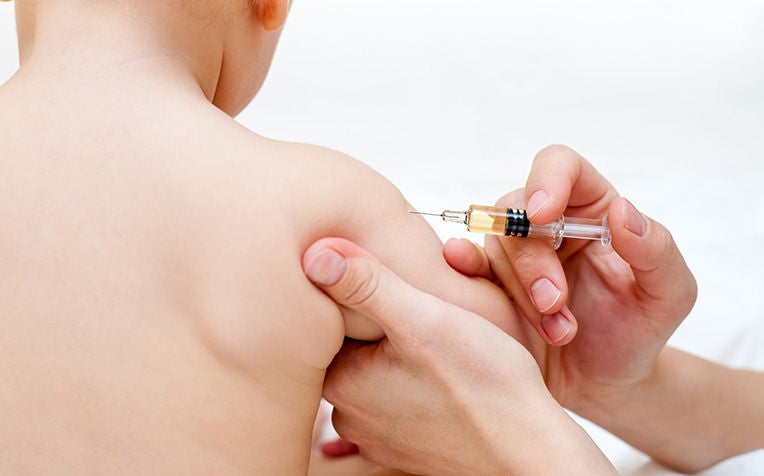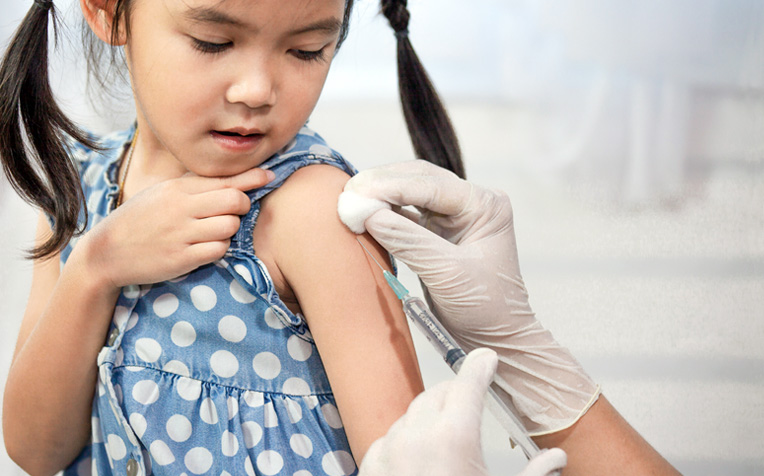
Children infected with the hepatitis B virus usually show no symptoms.
Infants and children infected with the hepatitis B virus often do not show any symptoms. This, coupled with the infectious nature of the disease, means that carriers could unknowingly pass the disease to other children.
Associate Professor Thoon Koh Cheng, Head and Senior Consultant,
Infectious Disease Service,
KK Women’s and Children’s Hospital (KKH), a member of the
SingHealth group, stresses the importance and highlights the advantages of vaccinating children against hepatitis.
Vaccinate against hepatitis!
Immunisation is the best chance your child has against hepatitis B. If a family member is a carrier, additional household precautions should be taken. These include ensuring your child does not have access to sharp objects (discarded needles or shavers), avoiding direct contact with open wounds and not sharing food from the mouth. Breastfeeding, however, is considered safe. Similar precautionary measures at home are also advised for children who are in contact with a hepatitis C-infected person.
While there are currently no vaccines against hepatitis C, both hepatitis A and B can be effectively prevented with vaccinations. In fact, hepatitis B vaccinations, which are 95 per cent effective, have been part of the National Childhood Immunisation Schedule since 1985 as it is thought to be the best value-for-money intervention against the disease.
“Vaccination not only benefits the vaccinated child, but lowers the risk of them potentially passing the disease to others in the community, especially those who cannot be vaccinated for various reasons. In working for the greater good, vaccination provides “enhanced” protection, which is greater than direct protection because, this way, we can eliminate the disease rather than just control it,” said Assoc Prof Thoon.
“Vaccination directly reduces the risk of long-term infection with hepatitis B and, hence, reduces the long-term risk of liver cirrhosis and liver cancer.”
Presently, hepatitis A vaccinations are not routinely administered in children and are, instead, recommended only when travelling to countries where the disease is more prevalent.
3 tips about hepatitis vaccination for your children
- Infants in Singapore are vaccinated against hepatitis B as part of a national programme
- Three doses of vaccine administered: at birth, at one month and at five to six months
- First two doses offer rapid protection, while the third extends protection for as long as possible
- It is not recommended for some children
- Those who develop a life-threatening allergic reaction to a previous dose of vaccine
- Those who have known allergies to any vaccine constituents such as yeast
- Those who develop a life-threatening allergic reaction to a previous dose of vaccine
-
Generally, repeat vaccinations are not necessary
- Protection is believed to last at least 25 years for many children, and is probably lifelong for some
- Repeat testing and jabs are advised in children (or adults in later life) if they are at risk, such as if they come into contact with an infected person, require blood transfusions, work in the healthcare sector, prior to receiving some medications, or engage in high-risk sexual behaviour
The ABCs of hepatitis
The disease is essentially an inflammation of the liver, which may be due to a viral infection or exposure to toxic substances, alcohol or certain medication. Although hepatitis A, B and C are similar in nature, the virus that causes each disease is different.
| Hepatitis A | Hepatitis B | Hepatitis C | |
|---|---|---|---|
| Caused by | Hepatitis A virus (HAV) | Hepatitis B virus (HBV) | Hepatitis C virus (HCV) |
| Symptoms | Tiredness, loss of appetite, fever, nausea, vomiting, stomach pain, weight loss, joint pains, yellowing of eyes and skin (jaundice), dark urine, pale stools | ||
| In children | Less than six years old. Usually do not experience noticeable symptoms, with jaundice occurring in only about 10 per cent | Vast majority of infections are “silent” or without symptoms | |
| Older children | Experience more severe symptoms, with more than 70 per cent developing jaundice | ||
| Complications | Recovery usually takes several weeks or months without complications | 90 per cent of children may become chronic hepatitis B carriers if unvaccinated. Of these, up to a third may develop chronic liver cirrhosis (liver hardening which can lead to liver failure) and a small percentage may develop liver cancer | About 15 to 20 per cent may develop chronic liver cirrhosis or cancer, although this may take decades in children |
Ref: O18
Contributed by


















 Get it on Google Play
Get it on Google Play